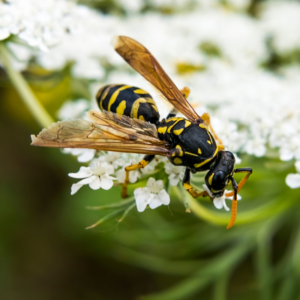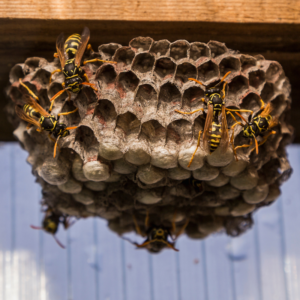So, it’s not all that uncommon to hear of birds building nests in fireplaces. Even raccoons, squirrels, and the occasional opossum working their way from time to time! And while these guests aren’t exactly easy to get rid of, most know the proper protocol for animal removal – call on a team of professional to clear them out!
But this time of year we tend to get calls regarding a creature that’s less known for camping out in chimneys – the wasp.
 Wasps tend to gather in flues and chimneys this time of year because of the cooler temperatures. They’ll be drawn to the heat of your chimney, and if it doesn’t have any lingering smoke or fire smells, they’ll deem it a perfect spot to set up camp. Unfortunately, this isn’t so ideal for the homeowner who now has to worry about buzzing noises and stinging insects potentially invading their space.
Wasps tend to gather in flues and chimneys this time of year because of the cooler temperatures. They’ll be drawn to the heat of your chimney, and if it doesn’t have any lingering smoke or fire smells, they’ll deem it a perfect spot to set up camp. Unfortunately, this isn’t so ideal for the homeowner who now has to worry about buzzing noises and stinging insects potentially invading their space.
Needless to say, avoiding their entry is the most ideal route, but what can you do if they’re already present?
Smoking Them Out
So, even our experts agree that, in most cases, smoking an animal out of your chimney won’t end well. They’ll likely just die in there, leaving you with even more problems on your hands, like clogs and lingering odors.
In the case of wasps, though, lighting a fire is actually one of the more effective ways to send them away! As we mentioned above, they can sense when a fireplace hasn’t been put to use recently, and they’ll be drawn to it because of that. That said, if you light fires regularly, they will note the smokey smell and know to stay away (or to move out if they’ve already starting building a nest).
Smoking them out also works better than sprays or pesticides, as these only offer a short-term fix due to their inability to stick to the metal components of your system. And we don’t recommend sealing things up either (another common approach) as this just invites more problems.
The good news is that, since temperatures tend to drop a bit this time of year, the wasps should be a bit more docile. That means you won’t have to stress as much about them taking the attack.
Removing Nesting Materials
 Once the wasps are out, removing the nest is imperative for avoiding potential chimney fires and other hazards. Their nest is thin, dry, and paper-like, making it the perfect fuel for any stray flames and sparks.
Once the wasps are out, removing the nest is imperative for avoiding potential chimney fires and other hazards. Their nest is thin, dry, and paper-like, making it the perfect fuel for any stray flames and sparks.
Removing it as soon as possible will also help prevent the wasps from attempting to return to the same nesting spot.
Once your system is free and clear, the next course of action should be to schedule a professional chimney inspection to guarantee everything is safe and ready for use. An inspection will also reveal if a sweeping or any repairs are necessary.
Preventing Their Return
So, the wasps are gone and your chimney is nest-free. This is great, but… we’re guessing you don’t feel quite at ease yet. And we can’t say we blame you! What you need is action steps that guarantee the wasps will stay gone for good.
Here are some options we recommend:
- Have a New Chimney Cap Installed: The main purpose of a chimney cap is to keep things out of your chimney that should not be there. That includes any creatures that may be looking to build a nest and take things over!
- Invest in a Top-Sealing Damper: Top-sealing dampers seal tightly at the top of your flue, working alongside your chimney cap to keep out rain, debris, downdrafts, and – you guessed it – unwanted animals and insects.
- Have Masonry & Mortar Cracks Sealed: Gaps and openings throughout your chimney can give wasps easy access to your system’s interior. These defects also leave you vulnerable to fire hazards and gas leaks, so investing in necessary repairs (like tuckpointing) right away from a qualified pro is a must!
- Move Trash, Bird Feeders, Etc. Away From Your Chimney: Keep bird feeders, trash cans, flowering plants, and other common wasp attractors well away from the side of your home with the chimney. The further they stay away, the better!
- Run Your Chimney: Like we mentioned above, running your chimney is a solid way to ensure wasps don’t come flying back around anytime soon. The smoke will deter them when fires are going, and any lingering smells after its out will warm them away, too.
- Invest in Professional Maintenance: The more diligent you are about scheduling annual inspection and investing in necessary maintenance, the more likely your chimney will remain pest-free. Professionals will note any vulnerable spots and provide the appropriate solutions for keeping your system better protected for the long haul.
Our Sweeps Are Ready for Your Call
Our Chimney Safety Institute of America (CSIA) certified sweeps are always ready and willing to help with any and all of your chimney and fireplace needs. Don’t put off the care you deserve. Give us a call or reach out online today, so our experts can put your mind at ease.
We look forward to speaking with you soon!
